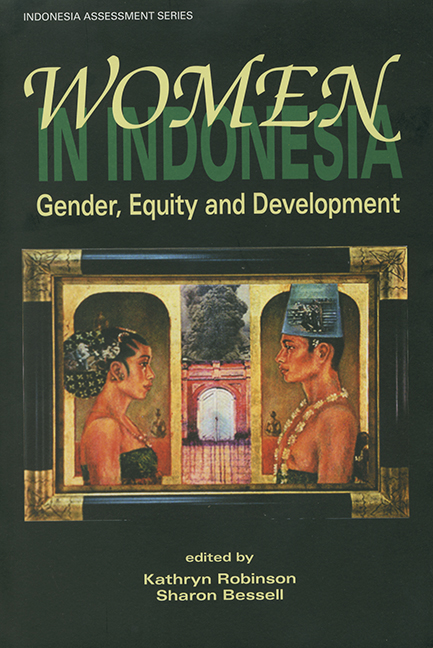Book contents
- Frontmatter
- Contents
- Tables
- Figures
- Contributors
- Acknowledgments
- Glossary
- Prologue
- 1 Introduction to the Issues
- 2 The Mega Factor in Indonesian Politics: A New President or a New Kind of Presidency?
- 3 The Downfall of President Abdurrahman Wahid: A Return to Authoritarianism?
- 4 The Year in Review: From Blind Man's Bluff to Mega Expectations
- 5 Further Comments on the Economy, with a Gender Perspective
- 6 Institution Building: An Effort to Improve Indonesian Women's Role and Status
- Commentary
- 7 Feminism in Indonesia in an International Context
- 8 Gay and Lesbi Subjectivities, National Belonging and the New Indonesia
- 9 And the Winner Is … Indonesian Women in Public Life
- 10 Indonesian Women Artists: Transcending Compliance
- 11 Literature, Mythology and Regime Change: Some Observations on Recent Indonesian Women's Writing
- 12 Women and the Labour Market during and after the Crisis
- 13 Women's International Labour Migration
- 14 Customary Institutions, Syariah Law and the Marginalisation of Indonesian Women
- 15 Women's Grassroots Movements in Indonesia: A Case Study of the PKK and Islamic Women's Organisations
- 16 Women's Activism against Violence in South Sulawesi
- 17 Gender Mainstreaming and Sex-disaggregated Data
- 18 The Changing Indonesian Household
- 19 Women, Family Planning and Decentralisation: New Variations on Old Themes
- 20 Men, Women and Community Development in East Nusa Tenggara
- References
- Index
- INDONESIA ASSESSMENT SERIES
2 - The Mega Factor in Indonesian Politics: A New President or a New Kind of Presidency?
Published online by Cambridge University Press: 21 October 2015
- Frontmatter
- Contents
- Tables
- Figures
- Contributors
- Acknowledgments
- Glossary
- Prologue
- 1 Introduction to the Issues
- 2 The Mega Factor in Indonesian Politics: A New President or a New Kind of Presidency?
- 3 The Downfall of President Abdurrahman Wahid: A Return to Authoritarianism?
- 4 The Year in Review: From Blind Man's Bluff to Mega Expectations
- 5 Further Comments on the Economy, with a Gender Perspective
- 6 Institution Building: An Effort to Improve Indonesian Women's Role and Status
- Commentary
- 7 Feminism in Indonesia in an International Context
- 8 Gay and Lesbi Subjectivities, National Belonging and the New Indonesia
- 9 And the Winner Is … Indonesian Women in Public Life
- 10 Indonesian Women Artists: Transcending Compliance
- 11 Literature, Mythology and Regime Change: Some Observations on Recent Indonesian Women's Writing
- 12 Women and the Labour Market during and after the Crisis
- 13 Women's International Labour Migration
- 14 Customary Institutions, Syariah Law and the Marginalisation of Indonesian Women
- 15 Women's Grassroots Movements in Indonesia: A Case Study of the PKK and Islamic Women's Organisations
- 16 Women's Activism against Violence in South Sulawesi
- 17 Gender Mainstreaming and Sex-disaggregated Data
- 18 The Changing Indonesian Household
- 19 Women, Family Planning and Decentralisation: New Variations on Old Themes
- 20 Men, Women and Community Development in East Nusa Tenggara
- References
- Index
- INDONESIA ASSESSMENT SERIES
Summary
Textbooks of politics and media studies now tend to start from the assumption that ‘the conduct of democratic (or undemocratic) politics nationally and internationally depends more and more’ on the media (McQuail 1994: 1). Indonesia is no exception. The line between published news and unpublished information is now very fine: confidential documents with uncorroborated sources are constantly ‘published’ on the internet. In a fundamentally transformed media in post-Soeharto Indonesia, politics is increasingly better understood from what is in the press, on television or on the internet than from confidential briefings and private conversations at the presidential palace. The sources of understanding in and of Indonesia are now many, diverse and contradictory. This update is in large measure an interpretation of what has been ‘news’ in Indonesia in recent months.
A MEGA IMAGE ISSUE
In the late afternoon of 23 July 2001, Megawati Sukarnoputri became the fifth president of Indonesia, and the third in as many years. There was little mention in the national media that only two years earlier the political elite of all colours had written her off as a possible president for Indonesia. From the end of 1998, and particularly from the time of the spectacular success of the Indonesian Democratic Party of Struggle (PDI-P) in the 1999 elections through to the installation of Abdurrahman Wahid as president, conservative Islamic and liberal intellectual leaders found dozens of reasons to publicise why Megawati could not and should not become the nation's leader.
The Islamic argument, coming from sections of Nahdlatul Ulama (NU) and the United Development Party (PPP), is well known. It had two main themes. Dr AM Saefuddin, PPP office-bearer and with credentials as an Islamic intellectual, was repeatedly quoted in the media as saying that Mega (as Megawati Sukarnoputri is popularly known in Indonesia) was not from the Islamic community (kalangan Islam) and, indeed, might be a Hindu. The argument that received even more media coverage was that a woman president was not acceptable under Islam. Repeated by several senior NU figures, this view was based on the hadis interpretation which translates roughly as: ‘A community that makes a woman its leader will not prosper’ (cited in Ulil 1999: 156).
- Type
- Chapter
- Information
- Women in IndonesiaGender, Equity and Development, pp. 13 - 27Publisher: ISEAS–Yusof Ishak InstitutePrint publication year: 2002

